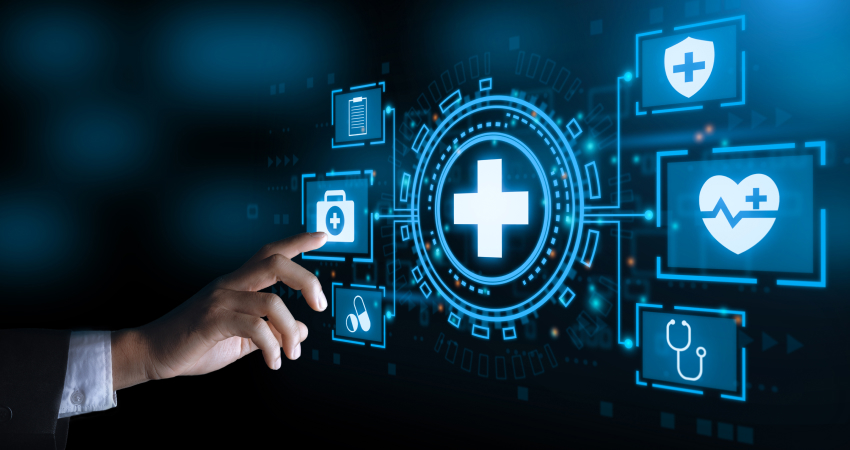Introduction:
Technology continues to reshape the healthcare industry, enabling more efficient and effective delivery of care, improving patient outcomes, and transforming the overall healthcare experience. As we step into 2023, several healthcare technology trends are set to make a significant impact. In this article, we will explore the major healthcare technology trends of 2023 and their potential to revolutionize the future of healthcare.
Artificial Intelligence (AI) and Machine Learning:
Artificial Intelligence and machine learning are driving advancements in healthcare by analyzing vast amounts of data, providing predictive analytics, and aiding in clinical decision-making. AI-powered algorithms can detect patterns, diagnose diseases, and recommend personalized treatment plans. Machine learning algorithms can continuously learn from data to improve accuracy and efficiency. In 2023, we can expect further integration of AI and machine learning into healthcare systems, leading to more precise diagnoses, efficient workflows, and improved patient outcomes.
Telemedicine and Remote Patient Monitoring:
The COVID-19 pandemic accelerated the adoption of telemedicine, and it continues to be a major healthcare technology trend in 2023. Telemedicine allows healthcare professionals to provide virtual consultations, monitor patients remotely, and deliver care beyond traditional healthcare settings. Remote patient monitoring devices, such as wearables and IoT-enabled sensors, collect real-time patient data, enabling healthcare providers to monitor vital signs, detect anomalies, and intervene promptly. The widespread use of telemedicine and remote patient monitoring enhances accessibility to healthcare, reduces costs, and improves patient convenience.
Blockchain Technology for Data Security:
Blockchain technology is gaining traction in healthcare for its potential to improve data security, interoperability, and patient privacy. Blockchain provides a decentralized and immutable ledger that enhances data integrity and prevents unauthorized access or tampering. In 2023, we can expect increased adoption of blockchain for secure sharing of medical records, streamlined health information exchanges, and efficient management of clinical trials. Blockchain technology has the potential to revolutionize data management in healthcare, ensuring trust, security, and seamless interoperability.
Internet of Medical Things (IoMT):
The Internet of Medical Things (IoMT) refers to the interconnected network of medical devices and applications that collect and exchange healthcare data. IoMT devices, such as smartwatches, fitness trackers, and implantable sensors, enable continuous monitoring of patients’ health parameters. These devices provide real-time data to healthcare providers, facilitating early detection of health issues and personalized interventions. In 2023, we can expect the proliferation of IoMT devices and the integration of their data into healthcare systems for more informed decision-making and proactive patient care.
Precision Medicine and Genomics:
Precision medicine leverages advances in genomics, molecular biology, and data analytics to tailor medical treatments to individual patients’ genetic profiles, lifestyles, and environmental factors. Genomic sequencing and analysis enable the identification of specific genetic markers that influence disease susceptibility, treatment response, and drug interactions. In 2023, we can anticipate the further integration of precision medicine into clinical practice, allowing healthcare providers to deliver personalized treatments, optimize drug therapies, and improve patient outcomes.
Augmented Reality (AR) and Virtual Reality (VR):
AR and VR technologies are finding applications in healthcare for training, simulation, and patient engagement. Surgeons can use AR overlays during procedures for real-time guidance, improving accuracy and reducing risks. VR-based simulations offer immersive training experiences for healthcare professionals, allowing them to practice complex procedures in a controlled environment. VR is also utilized for pain management, mental health interventions, and patient education. In 2023, we can expect increased utilization of AR and VR technologies in healthcare, leading to enhanced training, patient experiences, and therapeutic interventions.
Data Analytics and Predictive Analytics:
The abundance of healthcare data presents significant opportunities for data analytics and predictive analytics. Advanced analytics algorithms can extract insights from large datasets, identify trends, predict outcomes, and facilitate proactive interventions. In 2023, we can anticipate the integration of data analytics platforms into healthcare systems, enabling healthcare providers to make data-driven decisions, optimize resource allocation, and enhance population health management.
Conclusion:
The healthcare technology trends of 2023 hold immense potential to transform the way we deliver and experience healthcare. Artificial Intelligence, telemedicine, blockchain technology, IoMT, precision medicine, AR/VR, and advanced analytics are set to revolutionize patient care, diagnosis, treatment, and overall healthcare outcomes. As these technologies continue to evolve and mature, it is crucial for healthcare organizations and professionals to embrace and adapt to these trends to stay at the forefront of innovation and provide the best possible care to patients in the years to come. The future of healthcare is being shaped by these major technology trends, and their impact will continue to unfold, paving the way for a more connected, efficient, and patient-centric healthcare ecosystem.

